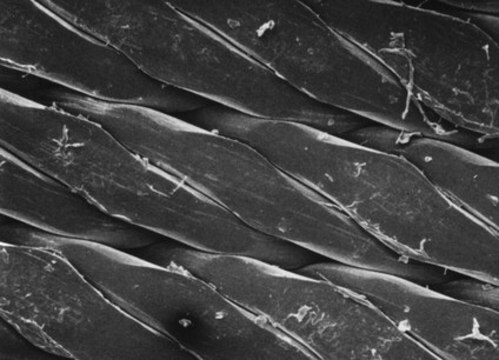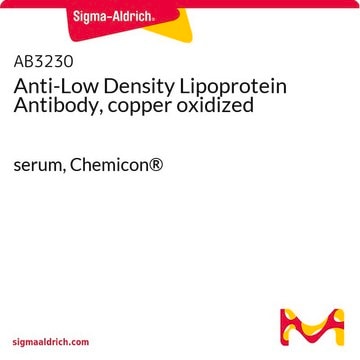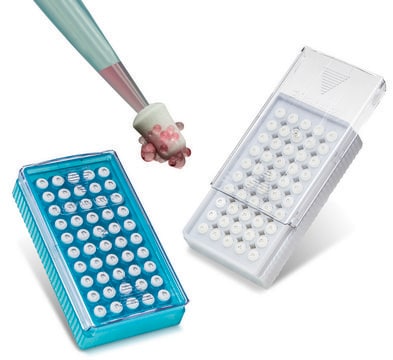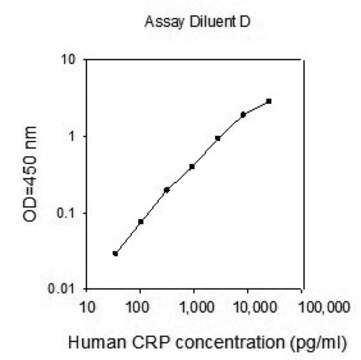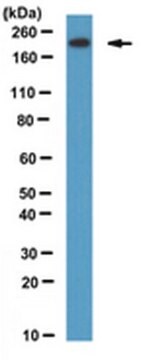MABS1270
Anti-Lipoprotein Lipase/LPL Antibody, clone 4-1a
clone 4-1a, from mouse
別名:
Lipoprotein lipase, hLPL, LPL
ログイン組織・契約価格を表示する
すべての画像(2)
About This Item
UNSPSCコード:
12352203
eCl@ss:
32160702
NACRES:
NA.41
クローン:
4-1a, monoclonal
application:
ELISA
ICC
IF
IHC
WB
ICC
IF
IHC
WB
化学種の反応性:
human, mouse, bovine, rat
テクニック:
ELISA: suitable
immunocytochemistry: suitable
immunofluorescence: suitable
immunohistochemistry: suitable (paraffin)
western blot: suitable
immunocytochemistry: suitable
immunofluorescence: suitable
immunohistochemistry: suitable (paraffin)
western blot: suitable
citations:
4
おすすめの製品
由来生物
mouse
品質水準
抗体製品の状態
purified immunoglobulin
抗体製品タイプ
primary antibodies
クローン
4-1a, monoclonal
化学種の反応性
human, mouse, bovine, rat
テクニック
ELISA: suitable
immunocytochemistry: suitable
immunofluorescence: suitable
immunohistochemistry: suitable (paraffin)
western blot: suitable
アイソタイプ
IgG2aκ
NCBIアクセッション番号
UniProtアクセッション番号
輸送温度
wet ice
ターゲットの翻訳後修飾
unmodified
遺伝子情報
human ... LPL(4023)
詳細
Lipoprotein lipase (EC 3.1.1.34; UniProt P06858; also known as hLPL, LPL) is encoded by the LPL (also known as LIPD) gene (Gene ID 4023) in human. Lipoprotein lipase (LPL) catalyzes the hydrolysis of triglycerides in plasma lipoproteins. LPL is produced by adipocytes and myocytes and secreted into the interstitial spaces, where it is bound by GPIHBP1 (a glycosylphosphatidylinositol-anchored protein of capillary endothelial cells) and shuttled to the luminal face of capillaries. The GPIHBP1–LPL complex is crucial for the binding of triglyceride-rich lipoproteins (TRLs) to endothelial cells and the subsequent lipolytic processing of TRLs. TRLs bind only the LPL-GPIHBP1 complex, but not GPIHBP1 alone, on the cell surface. A deficiency of either protein results in severe hypertriglyceridemia (chylomicronemia) and impaired delivery of lipid nutrients to parenchymal cells. LPL is produced with a signal peptide sequence (a.a. 1-27), the removal of which yields the mature 448-amino acid (a.a. 28-475) enzyme containing a PLAT (Polycystin-1, Lipoxygenase, Alpha-Toxin) domain (a.a. 341-464) and a heparin-binding domain (a.a. 346-441).
特異性
Clone 4-1a binds human and bovine LPL, as well as GPIHBP1-bound LPL, but not human hepatic lipase. Clone 4-1a does not inhibit LPL catalytic activity or LPL heparin interaction, nor does clone 4-1a compete against triglyceride-rich lipoproteins (LRLs) for bining GPIHBP1-LPL complex (Bensadoun, A., et al. (2014). Biochim. Biophys. Acta. 1841(7):970-976).
免疫原
Epitope: Near the N-terminus of mature LPL.
Purified human plasma lipoprotein lipase/LPL.
アプリケーション
Research Category
細胞シグナル伝達
細胞シグナル伝達
Research Sub Category
脂質代謝及びエネルギー調節
脂質代謝及びエネルギー調節
Anti-Lipoprotein Lipase/LPL Antibody, clone 4-1a is an antibody against Lipoprotein Lipase/LPL for use in Immunohistochemistry (Paraffin), Western Blotting, ELISA, Immunocytochemistry, Immunofluorescence.
Immunohistochemistry Analysis: A 1:50 dilution from a representative lot detected lipoprotein lipase/LPL immunoreactivity in human pancreas, human skeletal muscle, and rat heart tissue sections.
Western Blotting Analysis: A representative lot detected human plasma lipoprotein lipase (LPL) and bovine milk LPL by Western blotting. Clone 4-1a exhibited much reduced binding to murine or chicken LPL, and failed to detect human hepatic lipase (hHL) (Bensadoun, A., et al. (2014). Biochim. Biophys. Acta. 1841(7):970-976).
Western Blotting Analysis: A representative lot detected recombinant wild-type human LPL (rhLPL), as well as rhLPL with mutated Gln3 & Arg4. Clone 4-1a failed to react with rhLPL with mutated Ile8 or Asp9, nor rhLPL with either a.a. 5-15 or aa.16-25 deletion (Bensadoun, A., et al. (2014). Biochim. Biophys. Acta. 1841(7):970-976).
ELISA Analysis: A representative lot was employed as the capture antibody for the detection of human LPL by sandwich ELISA, using biotinylated clone 5D2 as the detcting antibody (Bensadoun, A., et al. (2014). Biochim. Biophys. Acta. 1841(7):970-976).
Immunocytochemistry Analysis: A representative lot detected the binding of human LPL to CHO and CHL cells transfected to express surface GPIHBP1, but not to mock transfected cells or cells transfected to express GPIHBP1 C65S mutant. Clone 4-1a does not compete against triglyceride-rich lipoproteins (TRLs) for binding the LPL-GPIHBP1 complex on cell surface (Bensadoun, A., et al. (2014). Biochim. Biophys. Acta. 1841(7):970-976).
Immunofluorescence Analysis: A representative lot detected hLPL immunoreactivity associated with GPIHBP1 on capillary endothelial cells in OCT-embedded, methanol/acetone-fixed frozen skeletal muscle sections from mice expressing muscle-specific human LPL transgene. Much lower immunoreactivity of the endogenous mLPL was detected in skeletal muscle sections from non-transgenic mice (Bensadoun, A., et al. (2014). Biochim. Biophys. Acta. 1841(7):970-976).
Note: Clone 4-1a exhibits much weaker affinity toward rat & murine LPL when compared with human LPL. Higher amount of sample loading (in Western blotting and ELISA) and/or high sensitivity detection method (e.g. HRP polymer or fluorescence detection in Western blotting and immunohistochemistry) is recommended when using this clone for detecting rat & murine LPL.
Western Blotting Analysis: A representative lot detected human plasma lipoprotein lipase (LPL) and bovine milk LPL by Western blotting. Clone 4-1a exhibited much reduced binding to murine or chicken LPL, and failed to detect human hepatic lipase (hHL) (Bensadoun, A., et al. (2014). Biochim. Biophys. Acta. 1841(7):970-976).
Western Blotting Analysis: A representative lot detected recombinant wild-type human LPL (rhLPL), as well as rhLPL with mutated Gln3 & Arg4. Clone 4-1a failed to react with rhLPL with mutated Ile8 or Asp9, nor rhLPL with either a.a. 5-15 or aa.16-25 deletion (Bensadoun, A., et al. (2014). Biochim. Biophys. Acta. 1841(7):970-976).
ELISA Analysis: A representative lot was employed as the capture antibody for the detection of human LPL by sandwich ELISA, using biotinylated clone 5D2 as the detcting antibody (Bensadoun, A., et al. (2014). Biochim. Biophys. Acta. 1841(7):970-976).
Immunocytochemistry Analysis: A representative lot detected the binding of human LPL to CHO and CHL cells transfected to express surface GPIHBP1, but not to mock transfected cells or cells transfected to express GPIHBP1 C65S mutant. Clone 4-1a does not compete against triglyceride-rich lipoproteins (TRLs) for binding the LPL-GPIHBP1 complex on cell surface (Bensadoun, A., et al. (2014). Biochim. Biophys. Acta. 1841(7):970-976).
Immunofluorescence Analysis: A representative lot detected hLPL immunoreactivity associated with GPIHBP1 on capillary endothelial cells in OCT-embedded, methanol/acetone-fixed frozen skeletal muscle sections from mice expressing muscle-specific human LPL transgene. Much lower immunoreactivity of the endogenous mLPL was detected in skeletal muscle sections from non-transgenic mice (Bensadoun, A., et al. (2014). Biochim. Biophys. Acta. 1841(7):970-976).
Note: Clone 4-1a exhibits much weaker affinity toward rat & murine LPL when compared with human LPL. Higher amount of sample loading (in Western blotting and ELISA) and/or high sensitivity detection method (e.g. HRP polymer or fluorescence detection in Western blotting and immunohistochemistry) is recommended when using this clone for detecting rat & murine LPL.
品質
Evaluated by Immunohistochemistry in mouse heart tissue.
Immunohistochemistry Analysis: A 1:50 dilution of this antibody detected lipoprotein lipase/LPL immunoreactivity in mouse heart tissue sections.
Immunohistochemistry Analysis: A 1:50 dilution of this antibody detected lipoprotein lipase/LPL immunoreactivity in mouse heart tissue sections.
ターゲットの説明
53.16 kDa (ProLPL) and 50.39 (Mature LPL) calculated. ~56 kDa observed (Bensadoun, A., et al. (2014). Biochim. Biophys. Acta. 1841(7):970-976).
物理的形状
Protein G Purified
Format: Purified
Purified mouse monoclonal IgG2aκ antibody in buffer containing 0.1 M Tris-Glycine (pH 7.4), 150 mM NaCl with 0.05% sodium azide.
保管および安定性
Stable for 1 year at 2-8°C from date of receipt.
その他情報
Concentration: Please refer to lot specific datasheet.
免責事項
Unless otherwise stated in our catalog or other company documentation accompanying the product(s), our products are intended for research use only and are not to be used for any other purpose, which includes but is not limited to, unauthorized commercial uses, in vitro diagnostic uses, ex vivo or in vivo therapeutic uses or any type of consumption or application to humans or animals.
適切な製品が見つかりませんか。
製品選択ツール.をお試しください
保管分類コード
12 - Non Combustible Liquids
WGK
WGK 1
引火点(°F)
Not applicable
引火点(℃)
Not applicable
適用法令
試験研究用途を考慮した関連法令を主に挙げております。化学物質以外については、一部の情報のみ提供しています。 製品を安全かつ合法的に使用することは、使用者の義務です。最新情報により修正される場合があります。WEBの反映には時間を要することがあるため、適宜SDSをご参照ください。
Jan Code
MABS1270:
試験成績書(COA)
製品のロット番号・バッチ番号を入力して、試験成績書(COA) を検索できます。ロット番号・バッチ番号は、製品ラベルに「Lot」または「Batch」に続いて記載されています。
Structure of dimeric lipoprotein lipase reveals a pore adjacent to the active site.
Gunn, et al.
Nature Communications, 14, 2569-2569 (2023)
Xuebing Wang et al.
Frontiers in physiology, 11, 1090-1090 (2020-09-29)
Hypoxic exercise may represent a novel therapeutic strategy to reduce and prevent obesity through the regulation of lipid metabolism. During hypoxic exercise, the targeting of peroxisome proliferator-activated receptor gamma (PPARγ) by miR-27b has been proposed to be one of the
Girolamo Di Maio et al.
International journal of molecular sciences, 23(20) (2022-10-28)
Two different types of adipose depots can be observed in mammals: white adipose tissue (WAT) and brown adipose tissue (BAT). The primary role of WAT is to deposit surplus energy in the form of triglycerides, along with many metabolic and
Wen-Hao Hsu et al.
Cancer discovery, 13(12), 2652-2673 (2023-09-28)
Oncogenic KRAS (KRAS*) contributes to many cancer hallmarks. In colorectal cancer, KRAS* suppresses antitumor immunity to promote tumor invasion and metastasis. Here, we uncovered that KRAS* transforms the phenotype of carcinoma-associated fibroblasts (CAF) into lipid-laden CAFs, promoting angiogenesis and tumor
ライフサイエンス、有機合成、材料科学、クロマトグラフィー、分析など、あらゆる分野の研究に経験のあるメンバーがおります。.
製品に関するお問い合わせはこちら(テクニカルサービス)

